Tinwala Hotel – does it strike a chord to those who are aware of Kolkata’s eateries of the past? Unlikely it will. Since it was way back in 1928 that Tinwala hotel was formed when Mullick Babu offered his piece of land in the heart of Kolkata’s commercial district to Ali Baksh and Ali Mohammed so that they can convert the tea stall on the pavement to an eatery with temporary shed so that they can earn more by selling rice-daal meals.
As I waited for my friends to join in, I thought it is apt not to waste this valuable time just like that. Hence two of us ordered for a plate of Mutton korma and one roti, so that we spend the time meaningfully. Obvious curiosity will be why Mutton Korma. If one has to name the second most popular and one of the oldest dish in this place, it is Mutton Korma. Well the dish, which is synonymous with this place and for which we planned to be there, has to wait for others to join in.
Subtly sweet, less spicy, thicker gravy caressed and cajoled with the right proportion of cashew paste is what characterizes the legendary Korma of this place. Four pieces of succulent mutton and a bright well boiled egg with a nice wholesome potato epitomizes this dish. The first spoonful of gravy said it all – way I described above. Just about the time I tore the first piece of Tandoori roti and dipped it into the tempting gravy after wrapping it with a piece of potato, did Jamal ji arrive. Aged over 80, he came down from his place after Namaz, to meet us. And that’s where my tryst with Korma ended. Because what followed was something far more rare and wholesome than the Korma that he architect ed decades back.
His words expressed the gratitude for Mullick Babu. Not only did Mullickbabu give the land and help the two brothers start the eatery, but around 1953, Mullick Babu also helped the brothers replace the Tinwala roof to a concrete roof and build masonry walls. All these years since 1928, the two brothers served what is good, what is pure – maybe that was the foundation of Tinwala Hotel renaming itself as Aliah – which means pavitra / pure.
While they served food with the honest intention, but some of the regular clientele of that area eluded them since beef curry was one of the popular fare. Hence in 1957, they decided to stop serving beef so that they can attract a larger working population of that area.
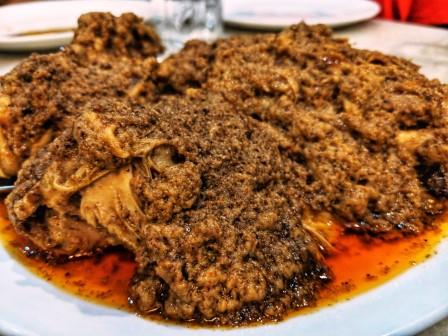
The ceremonious entry of Murg Masallam, the reason for which we were there, was of course quite a distraction. And my obvious next question to Jamal ji was why this place is synonymous with this dish. He asked me if I have attended a dawat after a muslim marriage? He went on to share that this dish is a must for the dawat in a marriage when the dulha-dulhan sits together to eat. A plate of it (one whole chicken) is served for every four persons, as a practice. Its omnipresence in the most eventful occasion of a couple’s life led them to focus on this. Do note that you need to order this the previous day, else you won’t get it. The process of marination of a whole chicken needs a certain number of hours. Allow the hot rotis to arrive and then sweep a roti-ful of the thick gravy clinging onto the chicken pieces. I can assure you, you will regret not ordering some more since whatever is there on your plate will seem very less. Unlike many places, theirs is not stuffed with dry fruits inside the chicken and that makes me crave for it more. Aren’t pebbles an irritant when you drive on a smooth road?
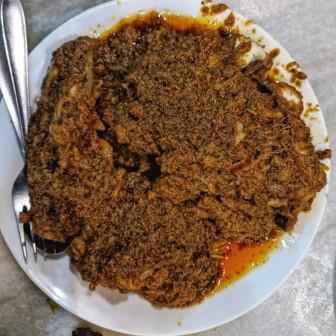
While the recipe of all such dishes remains a close guarded secret in such places, the medley of cashew, peanut and poppy seed paste is clearly evident as you eat it. The process of cooking and the amount of cooking medium is what differentiates it from a chicken chaap apart from secret ingredients. Chickens are brought live and then cut to pieces as per preparation at their place. Each preparation will have its own cut. Not often have i seen 2 whole chickens disappearing from the tables in such a short time.
“If someone comes and asks you that you can only feed me with one item at your place, what will you recommend him?” was my friend’s question. “So far whatever you have had are with ground masalas. We grind all our spices here in our kitchen. There is one dish where we use only whole spices and that is mutton stew. I will recommend the person to have this dish at our place”.
Weren’t we filling too full just a few minutes back? Then, how come we never even blinked once before ordering 4 plates of mutton stew at that juncture? And how about some parathas? In all our haste, we gobbled up all the dishes so far with the hot tandoori rotis which were done so well that it was almost as soft as a tawa roti. While the color maybe misleading, the taste of the stew reminded me of Sunil Gavaskar’s late-cut shots – on a slow motion, one will feel he is letting the ball pass and then gently extend his bat to glide the ball down third man. As you tuck the gravy in with the roti/ paratha into your mouth, the initial momentary feeling will be of relative blandness compared to Korma or Chaap, and then slowly the aroma of whole spices will erupt late into your mouth as the medley glides down your throat.
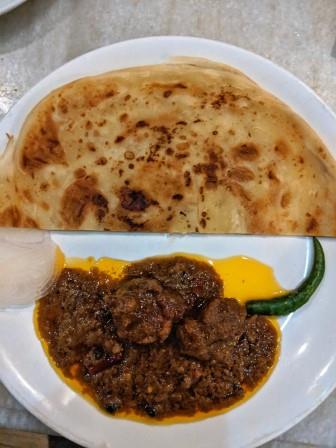
With an attempt to restructure their business, the owners created New Aliah in the same place Aliah ran so long in 1982. And for those who are not aware of its location, it is at the first junction on your left after Victoria House as you walk towards Lalbazaar from KC Das. Aliah Hotel started operating in newly acquired place in Park Circus.
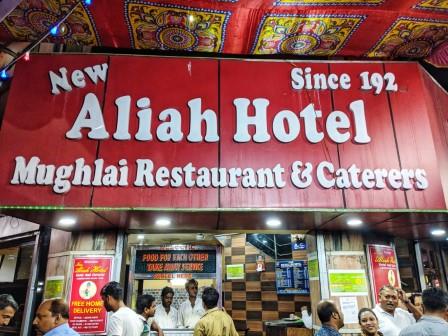
With great difficulty, we forced ourselves into ordering the phirni. There are a couple of places in this city where the phirni is to swear for though they complete differ in taste and have their own claim to fame. New Aliah is surely one of them and it lacks the traditional use of kesar that Aminia is famed for and also is not as milky which makes Sabir stand out. It keeps boiling the milk to the extent of it turning red and that leads to the taste getting deeply settled in your tongue for quite a while after you have finished it off.
Md Jamal Ahmed used to teach Sanskrit in a school in Bihar till 1964. But then his relatives called him over to Kolkata basis his natural abilities around food and the rice-daal Tinwala Hotel converted itself to a hotel serving Mughlai food around 1964, which coincides with Jamal ji’s coming to Kolkata. He has traveled far and wide to understand the nuances of the Awadhi cuisine, ways masalas (spices) are made, types of utensils for specific dishes and so on. He got up and said “Namaz ka time ho raha hai” (time for my Namaz). Before he moved on, he shared a Sankrit sloka on the value of good karma and slowly walked away for his Namaz.
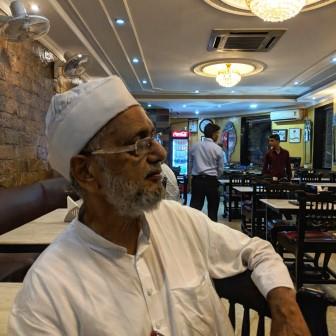
Md Jamal Ahmed (Jamal Ahmed Jamal as he is known now), a Sanksrit teacher transforming a rice-daal eatery into one the most famed Mughlai joints of Kolkata, practicing Sanskrit verses and Urdu poetry in his spare time and sharing Sanskrit sloka on honest karma before his Namaz! Jamal ji walked away leaving a taste of a life which has seamlessly amalgamated across cultures and religion and spreading an aroma of hope for the future that left a deeper and longer impression than the food that he has curated for so many decades.






This is the most endearing read so far. by the way what was the sanskrit slok used to describe the Korma?
LikeLiked by 1 person
No no. He used a Sanskrit slok to describe Karma.
LikeLiked by 1 person
okay which sanksrit slok was it?
LikeLike
Impossible to recall now
LikeLike